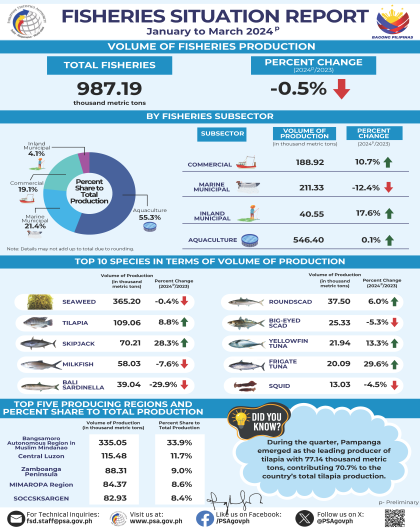Fisheries Situation Report, January to March 2024

In the first quarter of 2023, the volume of fisheries production was recorded at 991.14 thousand metric tons. This reflects an increase of 2.0 percent compared with the 971.76 thousand metric tons output in the same period of the previous year. Production increases were noted in marine municipal fisheries and aquaculture subsectors, while commercial and inland municipal fisheries subsectors reported setbacks. (Figure 1 and Table 1)

Commercial fisheries production was estimated at 170.60 thousand metric tons during the period, which indicates a decline of -3.7 percent from the 177.14 thousand metric tons recorded production in the same period of 2022. The subsector contributed 17.2 percent to the total fisheries production during the quarter. (Figure 2 and Table 1)

The marine municipal fisheries output reached 240.43 thousand metric tons during the first quarter of the year. This was 9.8 percent higher than the same quarter of 2022 level of 218.97 thousand metric tons. The subsector’s share to the total fisheries production during the period was 24.3 percent. (Figure 3 and Table 1)

Inland municipal fisheries production recorded an output of 34.48 thousand metric tons during the quarter. This exhibited a decline of -11.7 percent from the same period of the previous year’s estimate of 39.05 thousand metric tons. Of the total fisheries production during the quarter, inland municipal fisheries comprised 3.5 percent. (Figure 4 and Table 1)

During the first quarter of 2023, aquaculture production was registered at 545.64 thousand metric tons, which was higher by 1.7 percent compared with the previous year’s same quarter output of 536.60 thousand metric tons. Aquaculture subsector constituted the biggest share of 55.1 percent to the total fisheries production during the period. (Figure 5 and Table 1)
Of the 20 major species, increases in production were mainly noted in tilapia (10.8%), milkfish (bangus, 6.6%), squid (pusit, 18.2%), and big-eyed scad (matangbaka, 5.9%). (Table 2)
On the other hand, significant declines in production were primarily reported in frigate tuna (tulingan, -29.0%), roundscad (galunggong, -13.5%), and seaweed (-1.0%). (Table 2)


DIVINA GRACIA L. DEL PRADO, PhD
(Assistant National Statistician)
Officer-in-Charge, Deputy National Statistician
Sectoral Statistics Office

